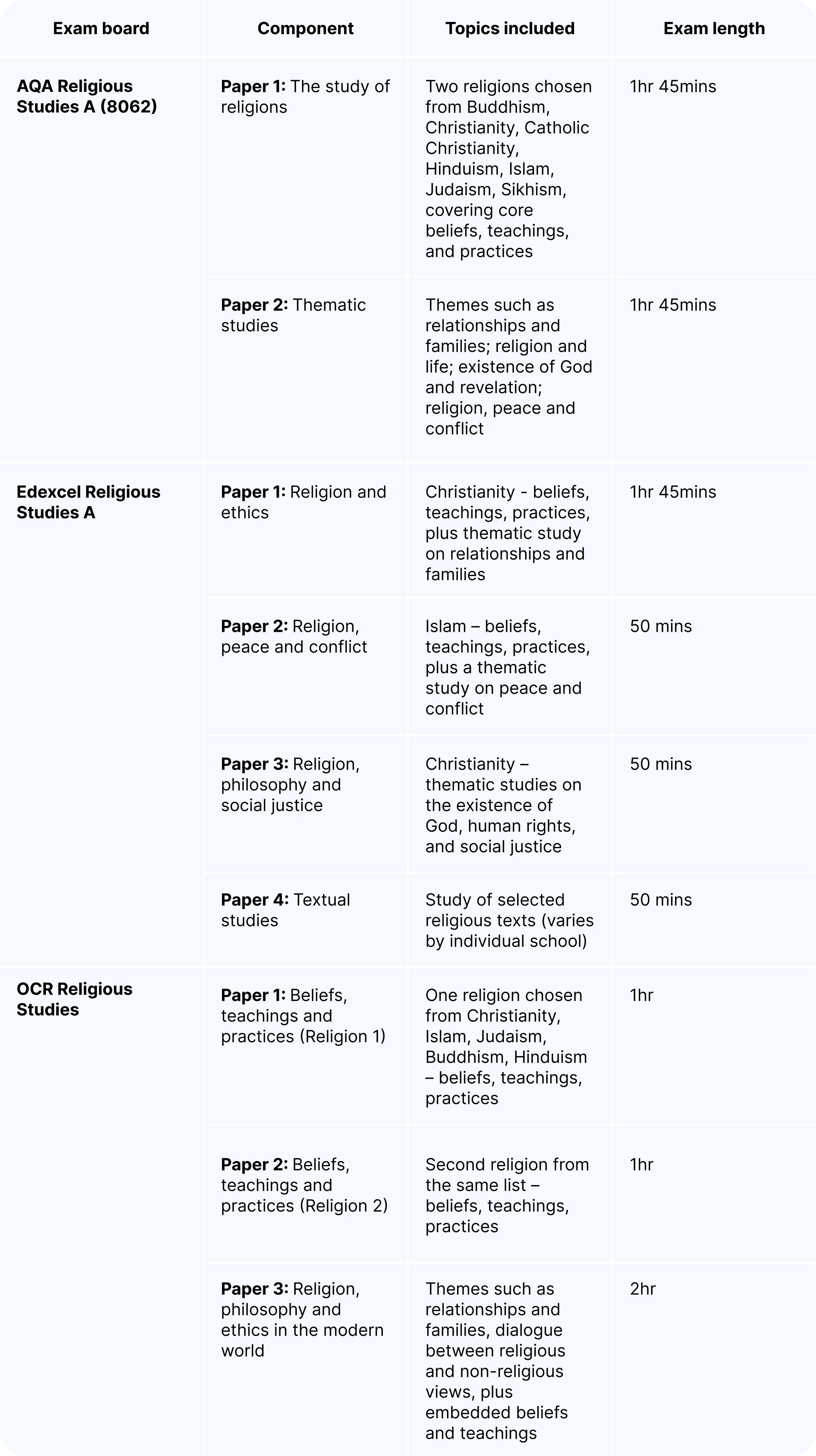GCSE Religious Studies breakdown: topics, learning objectives & sample questions
By Atom | Aug 18, 2025, 2:35 PM
Contents
GCSE Religious Studies is about more than memorising facts; it’s a subject that challenges students to think deeply, question respectfully, and understand the beliefs and values that shape our world.
This guide breaks down the key topics, explains what examiners are looking for, and provides sample questions to help students confidently prepare.
What this post covers:
The main topics in GCSE Religious Studies
Learning objectives set by exam boards
Sample exam questions for practice
Practical tips to support revision
Why Religious Studies matters for GCSE success
Religious Studies is about more than learning what different faiths believe, it encourages exploration of life’s big questions, respectful discussion, and an appreciation of diverse perspectives. The subject develops skills such as forming balanced arguments, interpreting sources, and considering multiple viewpoints before concluding.
These abilities are valuable for exam success and other GCSE subjects, further education, and many career paths. Studying different beliefs and values can foster open-mindedness, empathy, and confidence in engaging with the wider world.
Core topics by exam board
All GCSE Religious Studies courses include the study of at least two religions and a range of ethical or philosophical themes. However, the specific religions, themes, and assessment structure vary between exam boards. Here’s an overview of the most common specifications:

Key learning objectives
Exam boards assess students on:
Knowledge and understanding of beliefs, teachings, and practices within chosen religions
Interpretation of religious texts and sources to support points
Analysis and evaluation of different viewpoints, including non-religious perspectives
Application of knowledge to moral, ethical, and philosophical questions
Clear, structured communication in both short and extended answers
Sample questions by paper
These examples give a flavour of the types of questions students will face. Parents can use them for discussion or timed practice, and teachers can adapt them for planning and assessment.
AQA Religious Studies A (8062)
Paper 1: The study of religions
Two religions chosen from Buddhism, Christianity, Catholic Christianity, Hinduism, Islam, Judaism, Sikhism – beliefs, teachings, practices
Example question: Describe two Muslim beliefs about the Imamate in Shi’a Islam. (4 marks)
How to revise at home:
Make flashcards linking each belief to a supporting religious teaching or source.
Paper 2: Thematic studies
Thematic areas like religion and life, peace and conflict, existence of God, relationships and families.
Example question: “Religion always promotes peace.” Evaluate this statement, referring to Buddhist and non-religious views. (12 marks)
How to revise at home: Practise writing short “for” and “against” points before combining them into a full answer.
Edexcel Religious Studies A (1RA0)
Paper 1: Religion and Ethics
Example question: Describe two Hindu beliefs about karma. (4 marks)
How to revise at home: Make flashcards with key terms like karma, moksha and samsara.
Paper 2: Religion, peace and conflict
Example question: Explain two Sikh teachings about equality. (5 marks)
How to revise at home: Link each belief to a story or example from Sikh history to strengthen recall.
Paper 3: Religion, philosophy and social justice
Themes: existence of God, human rights, social justice
Example question: ‘The existence of suffering proves God does not exist.’ Evaluate this statement, referring to religious and non-religious views. (12 marks)
How to revise at home: Plan quick essay outlines with one point for and one against the statement.
Paper 4: Textual studies
Religious text chosen by the school from the exam board’s approved list
Example question: Explain two teachings from St Mark’s Gospel about discipleship. (5 marks)
How to revise at home: Highlight key passages and write one-sentence summaries for each.
OCR Religious Studies (J625)
Paper 1: Beliefs, teachings and practices (Christianity example)
Example question: “Give three ways in which Christians might worship during a church service.” (3 marks)
How to revise at home: List different worship actions and quiz each other on their meanings.
Paper 2: Beliefs, teachings and practices (Islam example)
Example question: “Give three ways in which Muslims might worship during daily prayer.” (3 marks)
How to revise at home: Use flashcards to match each act of worship to its description.
Paper 3: Beliefs, teachings and practices (Judaism example)
Example question: “Describe the nature of the Talmud.” (3 marks)
How to revise at home: Write a one-sentence summary of the Talmud and why it’s important.
Tips for revision and exam preparation
A strong revision plan for GCSE Religious Studies balances learning key beliefs and practices with practising how to write well-structured answers.
Here are some strategies that make a real difference:
1. Break topics into manageable chunks
Religious Studies covers multiple faiths and a range of ethical themes.
Focus on one area at a time, for example, revising Buddhist teachings on suffering or the Christian concept of forgiveness before moving on. This avoids overload and helps build confidence step by step.
2. Use sources of authority effectively
Examiners often expect answers to be backed up with quotes or references from scriptures and religious texts.
Create a short list of key sources for each religion studied and practise weaving them into written answers. Even one well-chosen quotation can secure higher marks.
3. Practise short and extended questions
The exam includes quick-fire knowledge checks as well as longer evaluative essays. Build the habit of practising both.
For shorter questions, focus on accuracy and clarity; for longer ones, practise structuring balanced arguments with clear conclusions.
4. Test recall with flashcards and quizzes
Flashcards are a useful way to memorise key terms and definitions such as karma, atonement, or sewa.
Parents can help by testing knowledge, or students can use apps for quick daily practice to strengthen recall.
5. Discuss and debate themes
Many topics in Religious Studies involve different perspectives on moral and ethical issues.
Talking these through with friends, family, or study partners helps refine arguments and improves confidence in expressing ideas clearly under exam conditions.
Building confidence for GCSE Religious Studies success
Whether it’s understanding different beliefs, exploring big ethical questions, or practising exam technique, GCSE Religious Studies offers valuable skills that extend far beyond the classroom. A clear grasp of the topics and exam structure for the chosen exam board can make revision more focused and effective.
With regular practice, thoughtful discussion, and a balanced approach to preparing for each paper, students can confidently approach their exams and achieve their full potential.
Don’t miss Atom’s GCSE giveaway!

Six months. Six epic prizes. Six chances to make the GCSE season unforgettable.
We’re launching Atom for GCSE prep in 2026, and to celebrate, over the next six months, we’re giving away thousands of pounds worth of prizes to help your child level up their GCSE revision.
Here’s a taste of what’s up for grabs:
The latest Apple tech, including an iPad Air, Vision Pro and more
Festival tickets for Boardmasters and Reading 2026
Europe interrail passes and £1,000 spending money
…and that’s just a few of the amazing prizes available.
Our first two winners have already taken home incredible prizes! Find out who they are and what they won in our latest giveaway update and keep an eye out for news of our November winner.
It’s free to join. UK only. Full T&Cs apply.
Contents
